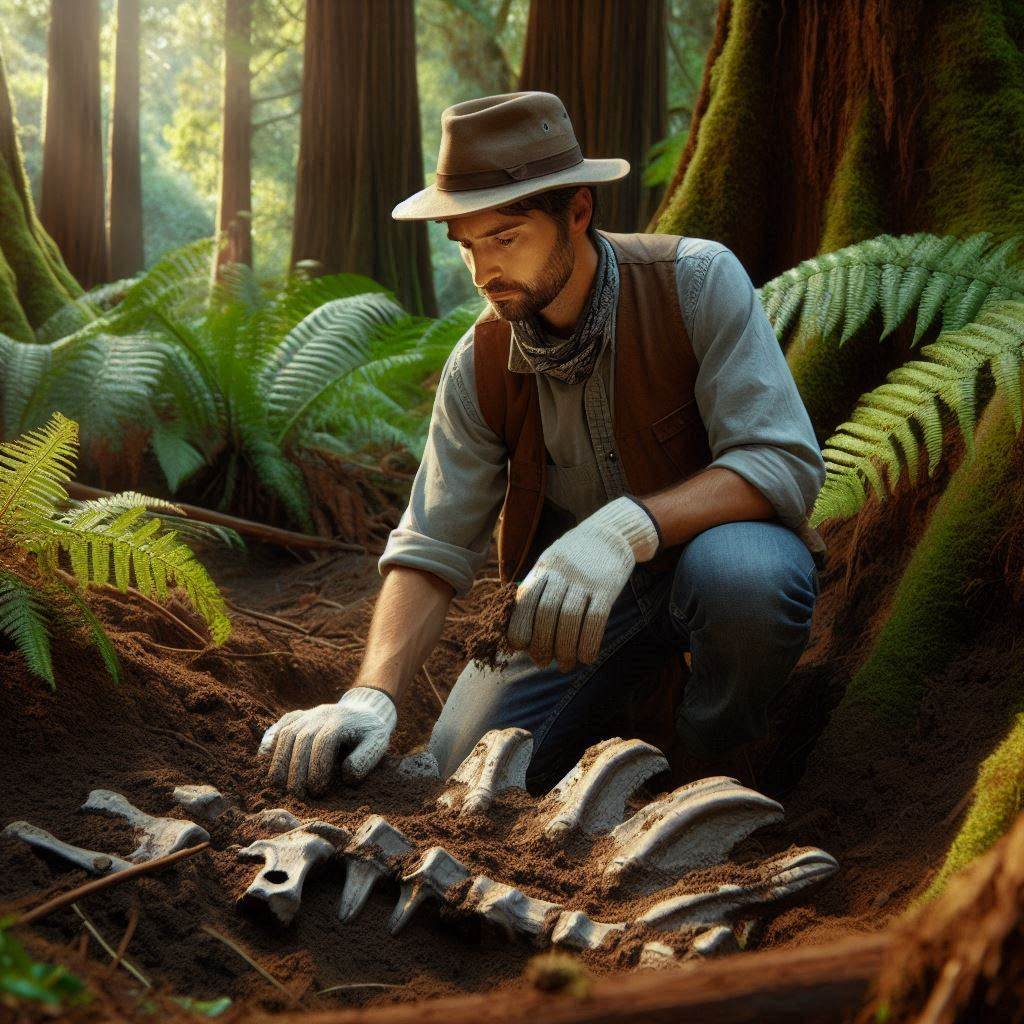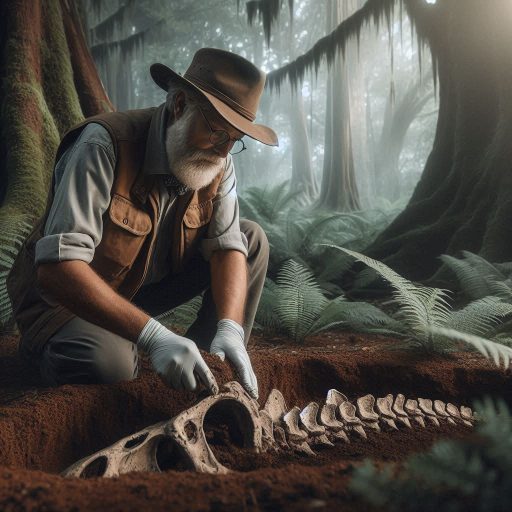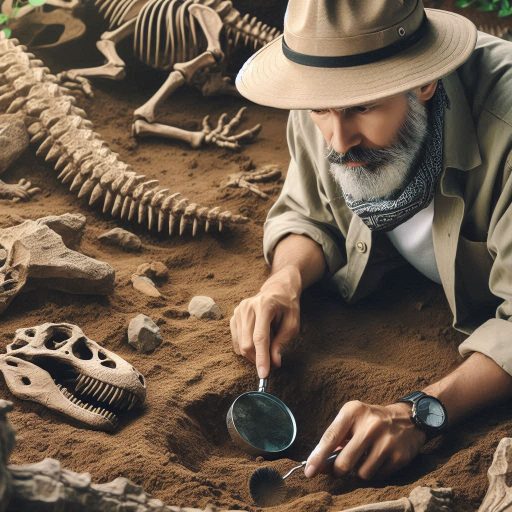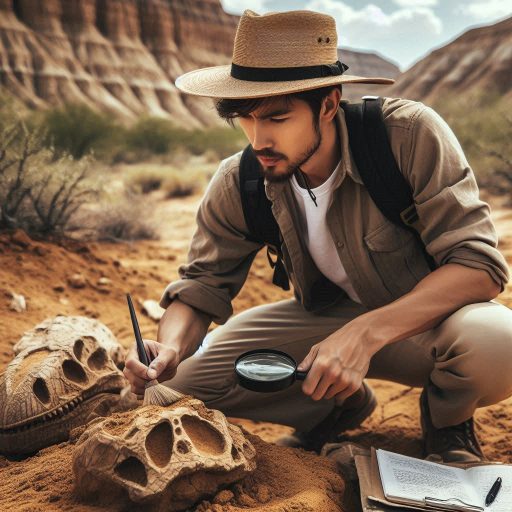Introduction
Paleontology is the scientific study of ancient life through the examination of fossils and geological formations.
This field provides valuable insights into Earth’s biological history and evolutionary processes.
Studying paleontology helps us understand the development of life, extinction events, and environmental changes over millions of years.
Paleontology plays a crucial role in addressing modern ecological challenges.
Knowledge of ancient ecosystems informs current conservation efforts and biodiversity studies.
By learning from the past, we can better understand how to protect our planet‘s future.
Several top universities in the USA offer excellent programs in paleontology.
The University of California, Berkeley, provides a renowned paleontology program with strong fieldwork opportunities.
Harvard University also boasts a prestigious program, featuring access to extensive fossil collections.
The University of Chicago emphasizes interdisciplinary studies, combining paleontology with geology and biology.
Yale University offers unique research facilities and expert faculty specializing in various paleontological fields.
The University of Florida is known for its active research in vertebrate paleontology, particularly in fossilized remains.
These universities provide aspiring paleontologists with the knowledge and skills needed to excel in the field.
By studying at these institutions, students gain a comprehensive understanding of ancient life and its relevance today.
University of California, Berkeley
Overview of Paleontology Programs
Many top universities in the USA offer exceptional paleontology programs.
These programs provide comprehensive education in geology, biology, and evolutionary science.
Students gain a strong foundation in the principles of paleontology through rigorous coursework and hands-on experiences.
Most programs offer Bachelor‘s, Master‘s, and Ph.D. degrees in paleontology or related fields.
Students learn about fossil identification, excavation techniques, and ancient ecosystems.
They also study paleobiology, stratigraphy, and geochemistry.
Fieldwork is an integral part of these programs, allowing students to apply their knowledge in real-world settings.
Furthermore, many universities emphasize interdisciplinary studies, combining paleontology with other scientific disciplines.
This approach fosters a broader understanding of Earth’s history and biological evolution.
Students often engage in collaborative research projects that enhance their learning experience.
Notable Faculty and Research Opportunities
Top universities boast notable faculty members who are experts in paleontology.
These professors bring a wealth of knowledge and experience to the classroom.
They often engage in groundbreaking research, offering students opportunities to participate in their projects.
Students can work alongside faculty on diverse research topics, from dinosaur biology to ancient ecosystems.
This hands-on research experience is invaluable for aspiring paleontologists.
It allows them to develop essential skills while contributing to the scientific community.
Some universities also invite guest speakers from the field of paleontology.
These speakers share insights about current research and developments in the field.
Such interactions provide students with a broader perspective on paleontology and networking opportunities.
Campus Resources and Facilities for Paleontology Students
Top universities offer excellent resources and facilities for paleontology students.
Many have dedicated laboratories equipped with advanced tools for fossil preparation and analysis.
Students learn how to use these tools effectively in their research projects.
Field stations and research centers are also common at leading universities.
These facilities often include access to fossil-rich sites for hands-on excavation experiences.
Students gain practical skills while working in the field, enhancing their understanding of paleontological methods.
In addition to laboratories, many universities have extensive fossil collections.
These collections allow students to study a wide variety of specimens.
Access to these resources enriches the educational experience and promotes independent research.
Libraries at these institutions often include vast archives of paleontological literature.
Students can access scientific journals, books, and databases to support their research.
Faculty members frequently guide students in navigating these resources effectively.
Moreover, universities often organize seminars and workshops focused on paleontology.
These events allow students to learn from experts and share their research findings.
Engaging with peers and professionals fosters a vibrant academic community.
Top universities in the USA provide outstanding paleontology programs.
Their notable faculty and diverse research opportunities enrich students’ educational experiences.
With access to advanced facilities and resources, aspiring paleontologists can develop their skills and knowledge.
These programs prepare students for successful careers in paleontology and related fields.
Read: Day in the Life: An Environmental Scientist‘s Typical Day
University of Michigan
Strengths of Paleontology Programs
Top universities for paleontology boast strong academic programs.
These programs often emphasize interdisciplinary learning, combining geology, biology, and ecology.
Students gain a comprehensive understanding of ancient life and its environments.
Many programs feature experienced faculty members who are active researchers.
Learning from these professionals provides students with valuable insights into current scientific advancements.
Faculty often engage students in research projects, fostering a hands-on approach to learning.
Moreover, universities frequently offer specialized courses in paleontology.
These courses cover topics such as vertebrate paleontology, invertebrate paleontology, and paleoecology.
This diverse curriculum allows students to explore various aspects of the field.
Some universities also provide opportunities for independent study.
Students can pursue their interests in specific paleontological topics.
This flexibility encourages personal growth and a deeper understanding of their chosen focus areas.
Museum of Paleontology and Its Resources
A Museum of Paleontology serves as a valuable resource for students.
These museums often house extensive fossil collections that enhance the learning experience.
Students can study specimens firsthand and engage with tangible evidence of ancient life.
Many museums offer access to state-of-the-art laboratories and research facilities.
These resources enable students to gain practical experience in fossil preparation and analysis.
Working in a lab setting helps students develop essential technical skills.
Additionally, museums frequently host lectures and workshops led by experts.
These events allow students to learn about current research and trends in paleontology.
Networking opportunities during these events can lead to collaborations and internships.
Furthermore, some museums offer volunteer or internship programs.
These experiences provide students with practical training in curation and public engagement.
Students gain insights into the operation of museums and the importance of public education.
Fieldwork Opportunities and Internships for Students
Fieldwork is a vital component of paleontological education.
Many top universities offer field courses that allow students to participate in real-world excavations.
These hands-on experiences are crucial for developing field skills and techniques.
Students often engage in fossil collection, excavation, and documentation.
Learning how to locate and extract fossils under expert guidance is invaluable.
Fieldwork helps students understand the complexities of paleontological research.
Internships are another excellent opportunity for aspiring paleontologists.
Many universities collaborate with organizations that offer internships.
These internships provide practical experience and enhance students’ resumes.
Interns can work at museums, research institutions, or even in the oil industry.
These diverse opportunities allow students to apply their knowledge in various contexts.
Gaining practical experience in different settings enriches students’ educational journeys.
Top universities for studying paleontology offer strong programs with numerous strengths.
Museums of paleontology serve as essential resources, providing students with hands-on learning experiences.
Fieldwork opportunities and internships further enhance students’ education, preparing them for successful careers.
By choosing the right university, aspiring paleontologists can unlock their potential and contribute to understanding Earth’s history.
Read: The Impact of Technology on the Chemist Profession in the US
Explore Further: Emergency Response: Meteorologists’ Critical Contributions
See Related Content: How to Gain Field Experience in Archaeology
University of Texas at Austin
Paleontology Faculty and Their Research Interests
Top universities for studying paleontology in the USA boast esteemed faculty members.
These experts have diverse research interests, enriching the academic environment.
Faculty often specialize in various aspects of paleontology, including vertebrate, invertebrate, and plant paleontology.
Their expertise provides students with a comprehensive understanding of the field.
Professors often focus on specific themes within paleontology.
Some may study the evolution of dinosaurs, while others explore ancient ecosystems.
This breadth of research allows students to find mentors who align with their interests.
Faculty members regularly publish their findings in scientific journals, contributing to ongoing discussions in the field.
Moreover, many faculty members are involved in fieldwork.
They lead student expeditions to fossil-rich sites across the country.
These experiences allow students to engage in real-world research and gain practical skills.
By participating in these field trips, students learn essential techniques for fossil excavation and analysis.
Collaborations with Museums and Research Institutions
Top universities often collaborate with museums and research institutions.
These partnerships enhance the educational experience for paleontology students.
Universities may have affiliated museums that house extensive fossil collections.
Students can access these resources for their research projects and coursework.
Collaborations with museums also offer opportunities for internships.
Students can gain valuable experience working alongside curators and researchers.
This exposure helps them develop professional skills essential for future careers in paleontology.
Internships often lead to networking opportunities and potential job offers after graduation.
Research institutions frequently partner with universities on various projects.
Collaborative efforts often focus on large-scale fossil excavations or innovative research methods.
Students benefit from these collaborations by gaining access to cutting-edge technology and resources.
Working alongside experienced professionals fosters a culture of learning and discovery.
Hands-On Learning Experiences for Students
Hands-on learning experiences are vital for students studying paleontology.
Many top universities emphasize practical training in their curricula.
Students engage in laboratory work, learning to prepare and analyze fossils.
This training helps them build technical skills that are crucial for their future careers.
Fieldwork is another essential component of hands-on learning.
Students often participate in field studies, where they can excavate fossils directly.
These experiences allow students to apply their theoretical knowledge in real-world situations.
They gain firsthand insight into the challenges and rewards of paleontological research.
In addition, universities may offer specialized courses focusing on specific techniques.
Courses on fossil preparation, stratigraphy, and paleoecology provide students with diverse skills.
Such training prepares graduates for various career paths within paleontology and related fields.
Many universities also host workshops and seminars led by guest speakers.
These events allow students to interact with leading researchers in paleontology.
They can gain insights into current research trends and potential career opportunities.
In essence, top universities for studying paleontology in the USA feature accomplished faculty, collaborations with museums, and hands-on learning experiences.
These elements create a rich educational environment, preparing students for successful careers in paleontology.
By engaging in research, fieldwork, and professional networking, students build a solid foundation for their future in the field.
Read: US Chemistry Conferences and Symposiums to Attend in 2024

Delve into the Subject: Top Universities for Nuclear Science Programs
Harvard University
Prestige and Reputation of Paleontology Programs
The prestige and reputation of paleontology programs greatly influence a student‘s education and career prospects.
Top universities often boast long histories of excellence in paleontological research.
Institutions like Harvard University and the University of California, Berkeley, have strong reputations in this field.
Their programs offer comprehensive curricula that cover various aspects of paleontology.
Students benefit from access to state-of-the-art facilities and resources.
They gain knowledge from leading experts in the field.
Many programs emphasize hands-on experience through fieldwork and laboratory work.
This practical approach allows students to apply theoretical knowledge in real-world settings.
The reputation of a university‘s paleontology program can enhance job opportunities.
Graduating from a prestigious institution can attract potential employers.
A well-respected program often indicates high-quality education and research.
Many graduates go on to hold influential positions in academia, museums, and research institutions.
Access to World-Renowned Paleontologists
Access to world-renowned paleontologists is a significant advantage of attending top universities.
Students can learn directly from experts who have made groundbreaking discoveries.
This interaction fosters a deeper understanding of current research trends and methodologies.
Instructors often engage in ongoing research, providing students with opportunities to participate.
Working alongside established paleontologists enhances students‘ learning experiences.
They gain valuable mentorship that can shape their academic and professional paths.
Additionally, renowned faculty often bring funding and resources to their programs.
This financial backing allows for advanced research projects and field expeditions.
Students can benefit from the extensive networks that these experts have built over their careers.
These connections can lead to internships, job placements, and collaborative research opportunities.
Funding Opportunities for Research Projects
Top universities frequently offer substantial funding opportunities for research projects.
Many programs provide grants, scholarships, and fellowships specifically for paleontological research.
These financial resources enable students to pursue independent projects and gain essential research experience.
Funding often supports fieldwork, allowing students to conduct excavations and collect fossils.
This hands-on experience is crucial for developing skills in fossil identification and analysis.
Many universities also have partnerships with museums and research institutions, offering additional funding sources.
Research funding helps students present their findings at conferences and workshops.
Sharing research with the broader scientific community enhances their academic profiles.
It also fosters connections with other researchers in the field.
Moreover, securing research funding is a valuable skill.
Learning how to write grant proposals prepares students for future academic endeavors.
It also demonstrates their commitment to advancing knowledge in paleontology.
To sum it up, attending top universities for studying paleontology offers numerous advantages.
The prestige and reputation of these programs enhance educational and career prospects.
Access to world-renowned paleontologists provides valuable mentorship and networking opportunities.
Additionally, funding opportunities support research projects that foster hands-on learning experiences.
By choosing the right institution, students can build a strong foundation for successful careers in paleontology.
Read: The Impact of Technology on the Chemist Profession in the US
Transform Your Career Today
Unlock a personalized career strategy that drives real results. Get tailored advice and a roadmap designed just for you.
Start NowConclusion
Several universities in the USA stand out for their paleontology programs.
The University of California, Berkeley, offers a robust curriculum and excellent research opportunities.
Yale University provides a strong focus on fossil preparation and vertebrate paleontology.
The University of Chicago is renowned for its interdisciplinary approach and access to significant fossil collections.
Additionally, Montana State University emphasizes hands-on experience with fieldwork and fossil excavation.
At the University of Kansas, students benefit from a comprehensive program that includes both geology and biology.
These institutions equip students with the skills and knowledge necessary for a successful career in paleontology.
Choosing the right university is crucial for academic and career success.
A strong program enhances your education and provides valuable networking opportunities.
It also allows access to experienced faculty and state-of-the-art facilities.
Aspiring paleontologists should pursue their passion and explore these top universities.
Investigate each program‘s offerings, faculty expertise, and research opportunities.
Engaging in fieldwork and internships will further enrich your experience.
By selecting the right educational path, you can pave the way for a fulfilling career in paleontology.
Your dedication to understanding Earth‘s history will contribute to important discoveries in this exciting field.
[E-Books for Sale]
The Big Book of 500 High-Paying Jobs in America: Unlock Your Earning Potential
$19.99 • 500 High-Paying Jobs • 330 pages
Explore 500 high-paying jobs in America and learn how to boost your career, earn more, and achieve success!
See All 500 High-Paying Jobs of this E-Book
1001 Professions Without a Degree: High-Paying American Jobs You Can Start Now
$19.99 • 1001 Professions Without a Degree • 174 pages
Discover 1001 high-paying jobs without a degree! Unlock career tips, skills, and success strategies for just $19.99!




